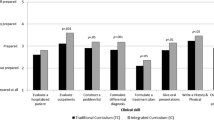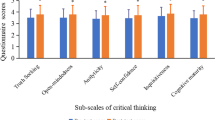Abstract
The professional development of medical students starts with clinical reasoning growth. Facilitating the growth of clinical reasoning, from a single method to a program strategy could be used. An integrated program between knowledge and performance was applied within the curriculum in the third year students. The program consist of two tutorial meeting with multilevel type scenario, a single integrated performance training, and apply Objective Structured Clinical Examination (OSCE) at the end of the third year. This study aimed to evaluate a clinical reasoning course by using the OSCE score at the end of the program. A simple pair t-test analysis was conducted to compare OSCE scores before and after this program was implemented. There was a significant difference in OSCE scores between before and after the course was implemented on three stations from a total of seven stations, regardless of whether it was a procedural or non-procedural type of station. This clinical reasoning program could positively influence students’ clinical reasoning growth. The course's length, and intensity given through tutorials and integrated training sessions influenced how the student can cognitively build critical thinking skills, especially the pattern of recognition and recall. However, more research is needed to better understand how much intensity is required in the sessions to build a firm tacit knowledge and pattern recognition.
Access this chapter
Tax calculation will be finalised at checkout
Purchases are for personal use only
Similar content being viewed by others
References
Linn A, Khaw C, Kildea H, Tonkin A (2012) Clinical reasoning: a guide to improving teaching and practice. Aust Fam Physician 41(1–2):18–20
Pelaccia T, Tardif J, Triby E, Charlin B (2011) An analysis of clinical reasoning through a recent and comprehensive approach: the Dual-Process Theory. Med Educ Online 16(1). https://doi.org/10.3402/meo.v16i0.5890
Thomson R, Lebiere C, Anderson JR, Staszewski J (2015) A general instance-based learning framework for studying intuitive decision-making in a cognitive architecture. J Appl Res Mem Cogn 4(3):180–190. https://doi.org/10.1016/j.jarmac.2014.06.002
Seidel BM, Campbell S, Bell E (2015) Evidence in clinical reasoning: a computational linguistics analysis of 789,712 medical case summaries 1983–2012. BMC Med Inform Decis Mak 15(19). https://doi.org/10.1186/s12911-015-0136-8
Kassirer JP (2010) Teaching clinical reasoning: case-based and coached. Acad Med. 85(7):1118–1124. https://doi.org/10.1097/ACM.0b013e3181d5dd0d
Cutrer, W. B., Sullivan, W. M., & Fleming, A. E. Educational strategies for improving clinical reasoning. Curr Probl Pediatr Adolesc Health Care. 29013;43(9):248–257. Available from: https://doi.org/10.1016/j.cppeds.2013.07.005
Bleakley A (2020) Re-visioning clinical reasoning, or stepping out from the skull. Med Teach 0(0):1–19. https://doi.org/10.1080/0142159X.2020.1859098
Zijl A., Loon, M., ten Cate, O., Case based clinical reasoning in practice. In Principles and Practice of Case- based Clinical Reasoning Education. Durning, S. J., Custers, E.J.F.M., ten Cate, O., (n.d.). Eds, Vol.15, Springer
Xu H, Ang BWG, Soh JY, Ponnamperuma GG (2021) Methods to improve diagnostic reasoning in undergraduate medical education in the clinical setting: a systematic review. J Gen Intern Med 36(9):2745–2754
Thampy H, Willert E, Ramani S (2019) Assessing clinical reasoning: targeting the higher levels of the pyramid. J Gen Intern Med 34(8):1631–1636. https://doi.org/10.1007/s11606-019-04953-4
Khan A, Ayub M, Shah Z (2016) An audit of the medical students’ perceptions regarding Objective Structured Clinical Examination. Educ Res Int. 1–4. https://doi.org/10.1155/2016/4806398
Kim KJ (2016) Factors associated with medical student test anxiety in Objective Structured Clinical Examinations: a preliminary study. Int J Med Educ 7:424–427. https://doi.org/10.5116/ijme.5845.caec
Turkistani AM (2018) Perceptions of clinical years’ medical students and interns about factors affecting their exam performance, King Abdulaziz University, Jeddahh. J Int Med Res 4(3):132–136. https://doi.org/10.31254/jmr.2018.4305
Al Rushood M, Al-Eisa A (2020) Factors predicting students’ performance in the final pediatrics OSCE. PLoS ONE.15:1–9. https://doi.org/10.1371/journal.pone.0236484
Park WB, Kang SH, Lee YS, Myung SJ (2015) Does objective structured clinical examinations score reflect the clinical reasoning ability of medical students? Am J Med Sci 50(1):64–67. https://doi.org/10.1097/MAJ.0000000000000420
Ethical Clearance
This research was already reviewed and gained the ethical approval from the institutional ethical review board with letter number KE/FK/0915/EC/2020.
Conflict of Interest
All of the authors have no conflict of interest with the publication of the research. We do hope that this research will enrich the science of evaluation in term of assessment for learning paradigm.
Funding
This research is part of evaluation research of the institution.
Acknowledgments
We want to extend our heartfelt thanks to Dr. dr. Denny Agustiningsih, M.Kes and the team of the medical education program who gave opportunity for accessing the data of this study.
Authors’ Contribution
HNR is the junior (main) researcher and the first author of this manuscript, PU is HNR colleague who worked together with HNR in analyzing the scores. TSH is HNR's supervisor in terms of curriculum and consultant in publishing this manuscript.
Author information
Authors and Affiliations
Corresponding author
Editor information
Editors and Affiliations
Rights and permissions
Copyright information
© 2023 The Author(s), under exclusive license to Springer Nature Singapore Pte Ltd.
About this paper
Cite this paper
Nurokhmanti, H., Utomo, P.S., Susilo, A.P., Prihatiningsih, T.S. (2023). “How Intense Should Be A Nurturing Program Physician Mindset?”. In: Claramita, M., Soemantri, D., Hidayah, R.N., Findyartini, A., Samarasekera, D.D. (eds) Character Building and Competence Development in Medical and Health Professions Education. INA-MHPEC 2022. Springer Proceedings in Humanities and Social Sciences. Springer, Singapore. https://doi.org/10.1007/978-981-99-4573-3_15
Download citation
DOI: https://doi.org/10.1007/978-981-99-4573-3_15
Published:
Publisher Name: Springer, Singapore
Print ISBN: 978-981-99-4572-6
Online ISBN: 978-981-99-4573-3
eBook Packages: MedicineMedicine (R0)




